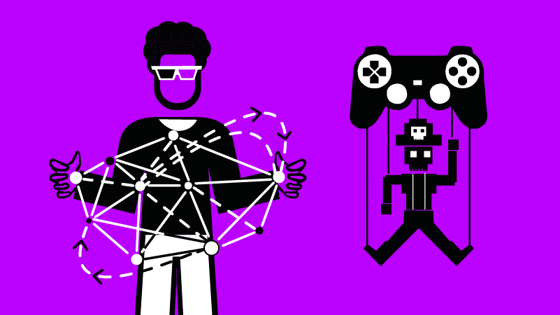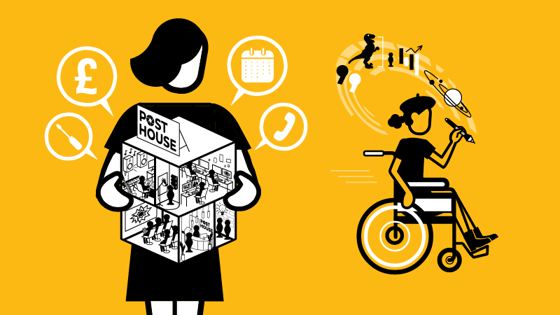Broadcast engineering
Trainee broadcast engineer
Also known as: Junior broadcast engineer

What does a trainee broadcast engineer do?
Trainee broadcast engineers help to ensure equipment in a studio or newsroom is in tip-top condition so that everything runs smoothly. The job is very varied; one minute a trainee broadcast engineer could be making sure the cables on the set of Strictly Come Dancing are properly taped down; the next they might be installing updates to an important app used in the studio. They are always supervised by a more senior engineer, so working as a trainee broadcast engineer is a brilliant role in which to learn and progress quickly.
A big part of a trainee broadcast engineer’s job is maintenance. If equipment isn’t properly looked after, computers might become slow and less effective, cameras could go out of alignment or cables could wear down and become dangerous. The team needs to be available to help fix problems at all hours of the day, so junior broadcast engineers must be prepared to work shifts.
Trainee broadcast engineers enjoy problem solving. They have a clear process of working out what is wrong with technology and fixing it. They learn how to test the equipment and are interested in how the individual pieces of kit link together. They can recognise when pictures are not looking quite right or when sound is distorted in some way – and find the best way to fix it.
Although trainee broadcast engineers are part of the engineering team, they work with everyone who uses the studios. When there are problems with technology, they go onto the floor of the studio to replace faulty equipment or into a working control room to reset a computer application. Trainee broadcast engineers reassure the people working in these areas, who may be very stressed with tight deadlines.
The benefits of working as a trainee broadcast engineer are that you can explore behind the scenes of broadcasting and learn the ins and outs of the technology involved. It’s an ideal way to find out where you might want your career to take you and in what area you want to specialise.
Watch and read
- Working in broadcast media technology panel hosted by RISE – Women in Broadcast
- Interview with Jahangir, broadcast engineer for Sky
- Why the industry needs more broadcast engineers
What are trainee broadcast engineers good at?
- Technical knowledge: Having a good understanding of how the equipment needed to broadcast a programme works
- Flexibility: Working on a wide range of equipment and technology
- Thinking outside the box: Coming up with new solutions to fix technical problems
- Teamwork: Reassuring colleagues, following clear instructions and advice; collaborating with people in lots of different roles.
Who does a trainee broadcast engineer work with?
A junior broadcast engineer is part of a larger engineering team, including a network systems engineer, broadcast maintenance engineer and IT support engineer.
They also work with the people making the programme, including producers, directors and journalists.
How do I become a trainee broadcast engineer?
You need to be great with technology and have an interest in broadcasting. If you’re the person in your family who’s always asked to help fix phones and laptops, the chances are you’d make a great junior broadcast engineer.
Some trainee broadcast engineers have a university or college qualification in a relevant subject, while others go down the more vocational route, either through work experience or an apprenticeship.
At school or college
If you’re interested in a career in broadcast engineering, A-levels in maths, physics and computer science would be good to get under your belt. You could combine these with subjects from the arts and humanities, such as English, history or music, which may come in useful for the content of the programmes you work with.
The following Level 3 vocational qualifications are also relevant to this role:
- BTEC in Engineering with Engineering Maths
- Cambridge Technical Extended Certificate in Engineering
- BTEC National Foundation Diploma in Engineering
- C&G Technical Certificate in Engineering
- EAL Technical Diploma/Extended Diploma in Engineering Technologies
- BTEC Diploma/Extended Diploma in Electrical and Electronic Engineering
- City & Guilds Advanced Technical Diploma in Electrical Installation
- EAL Diploma/Advanced Diploma in Electrical Installation
Selected schools and colleges have also started offering T-levels – a qualification equivalent to three A-levels that is designed to help you get into the industry of your choice. Study is 80% classroom- and 20% work placement-based.
The following T-levels would help to kick-start your career in broadcast engineering:
- Digital Production, Design and Development
- Digital Support Services
- Digital Business Services
- Design and Development for Engineering and Manufacturing
- Maintenance, Installation and Repair for Engineering and Manufacturing
- Engineering, Manufacturing, Processing and Control
Apprenticeships
Apprenticeships are jobs with training. Search for apprenticeships in broadcast engineering with broadcasters like BBC and Sky. Go to What’s an apprenticeship? to find out more and Where can I find an apprenticeship? to find apprenticeships in your region. Alternatively, you can approach companies directly. Take a look at our list of apprenticeships to find the schemes of the main broadcasters. The BBC has a three-year apprenticeship in broadcast engineering that offers experience in all the areas a technical manager must master. You might want to start your career with a digital and technology solutions professional apprenticeship or with a software engineering apprenticeship.
Volunteer
Get involved with events in your local community, whether that’s running the sound for your school talent show, managing the special effects for an amateur dramatics society or helping out at a volunteer-run radio station.
Contact theatre productions or local music venues that can get you behind the scenes of a production environment. Anything that gives you experience in dealing with equipment in a live environment will be helpful. Voluntary experience is great for your CV, because it shows you’re enthusiastic, have technical ability and experience and you work well as part of a team.
Get a degree
A degree in a maths or science subject would stand you in good stead for entering the world of broadcast engineering. You could also look at electronic engineering, software design or computing. Go to ScreenSkills Select to find university and college courses accredited by ScreenSkills.
Look outside the industry
If you can’t or don’t want to get into broadcast engineering straightaway, industries that require similar skills include telecoms, live events and radio. These would enable you to strengthen your technical abilities and get experience with technical equipment.
Get work experience
Write to local production companies and ask if they offer technical assistant roles. Keep an eye out for work experience opportunities at the BBC, ITV, Channel 4, Sky and the PACT Indie Diversity Training Scheme.
Alternatively, try approaching a rental equipment company that supplies productions with the gear they need. This will enable you to get your hands on equipment, learn more about it and get to know people who work in TV.
Take a short course
If you are over 18, make a ScreenSkills account and check out ScreenSkills’ Training and opportunities page and click on Training to see what courses are available, whether they are in person or online. The training doesn’t have to be linked directly to broadcast engineering; for example, a short course on developing resilience would help you understand how to thrive in challenging circumstances.
Network
Get to know people in the film and TV industry by attending events such as ScreenSkills’ Open Doors. Go to Training and opportunities and use the events filter to find out what’s on. Meet professionals and ask them questions about their work, while demonstrating interest in and knowledge of the industry. Offer to provide them with your professional contact details and try to stay in touch with them. Go to Network well to learn how to do this.
Network online
Create a LinkedIn profile. See if there are Facebook pages or other social media groups for people making film and TV in your area. Create a ScreenSkills profile. There are a lot of crewing agencies that will charge you to be on their books. Sign up to the free ones initially. Wales Screen, Northern Ireland Screen and Filming in England offer free crew databases and opportunities to network in person. Find a film office near you and get connected. If you do sign up to paid sites, make sure they specialise in the areas in which you’re interested.
Search for jobs
Search for jobs on the broadcasters’ websites as well as on LinkedIn and other job-hunting websites. Make use of the ScreenSkills jobs board. You can also send a short speculative letter with your CV to technical managers or vision supervisors
You might also be interested in...
Being a trainee IT support engineer, a trainee network systems engineer or a trainee technical project manager.
Further resources
- BritishFilm Commission list of UK studios
- Engineering Council
- Rise: Women in Broadcast
- The Institution of Engineering and Technology
- The International Trade Association for the Broadcast & Media Industry
- Society of Media Professionals, Technologists and Engineers
- International Broadcasting Convention
- The Media Production & Technology Show
- E&T (Engineering & Technology) magazine
- NEP UK and Ireland
- Broadcast – Tech Talks
- Broadcast Buddy TV YouTube channel
- BBC Research and Development
- BBC Academy
- ITV Entry Careers
- Sky early careers
- 4Skills (Channel 4)
- Bectu (the media and entertainment union)
- Bectu Ratecards







